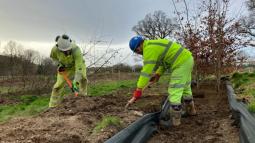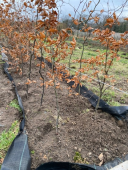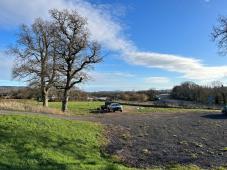Live Labs 2 blog - Devon County Council: creating the UK’s first 'carbon negative' highway
The spotlight returns to Devon in this month's blog and Beth Lewis, Devon County Council's Principal Engineer - Major Projects, tells us about some forward-thinking work which is providing carbon savings today as well as in years to come.
Em-barking on our tree relocation work
It’s great to see boots on the ground and work underway on the site of our A382 improvement scheme.
Although it’s early days, the preparatory work is providing a crucial element that has an immediate impact in saving carbon.
Translocation, relocation or transplanting of trees – whatever term you want to use – is expected to save us around 50 tCO2, which is a good start in our efforts to make the A382 at Newton Abbot the UK’s first carbon negative road.
Most highway improvement schemes plant young trees or 'whips' at the end of construction, but as with every aspect of our Live Labs 2 project we’ve chosen a slightly more innovative approach than the norm.
Establishing a temporary nursery
While some vegetation clearance from areas affected by the proposed layout of our development is unavoidable, our focus is on saving as many trees as possible during this stage of work.
That’s why we’ve created a temporary tree nursery which is now home to more than 2,000 trees for the next two years. You can watch the video to find out more: https://youtu.be/fjkWQMcbqYo
Teams on site dug rows of planting beds in a field near the road in preparation for the relocated trees, which have been moved from around half a mile away. Some have been dug by hand while others have been lifted from the ground using a machine with a hydraulic tree spade.
Our temporary nursery has everything the trees need, with an irrigation pond to store the water that naturally runs onto the land, which will provide us with water for the drier months later in the year. It’s certainly full right now!
Multiple benefits of relocating trees
We’ve effectively recreated the habitat of the native species we’ve been relocating such as yew, beech, hawthorn and privet.
As they’re used to the soil and conditions in the area it should mean there is a much lower failure rate when they’re finally replanted nearby, compared with bringing in trees from elsewhere once the scheme has been completed.
There are also many other benefits of relocating trees to a temporary nursery for the duration of the project.
The carbon footprint of moving the trees a short distance to the nursery is much smaller than taking delivery of trees from other parts of the country towards the end of the project. Not to mention the cost saving.
The trees in the nursery will continue to grow and absorb carbon over the next couple of years, and when they’re re-planted back in their new home they’ll be bigger than the whips usually planted which will create a greater visual impact on the scheme area once everything is planted, with greater benefits for habitat recreation.
Using harvested wood
While we may not be saving every single tree that's making way for the new road, we're aiming for harvested wood, which will be processed at a local sawmill, to be used for a variety of construction elements of the scheme. This is expected to include fencing, waymarkers, and possibly lighting columns.
Specialist cuts of wood can be donated to local wood turning groups and wood chip will also be donated to local community groups.
In the final part of our vegetation strategy we plan to covert the chipped vegetation into biochar, to capture carbon and improve soil quality.
The future?
It’s fair to say we’re proud that word of temporary nursery seems to be getting around and it’s certainly encouraging that there is already industry interest in what we’re doing.
Everyone working on our A382 project firmly believes that this element of our scheme has the potential to be a standout success so that in future we will see this kind of tree relocation adopted as standard practice throughout the industry.
That will be more than a pleasing result for us, but it will be an even more positive outcome for the environment and tackling carbon emissions.
Further information
- For more information on ADEPT Live Labs 2: Decarbonising Local Roads in the UK, please look at the Live Labs 2 section on the website
- For more information about the Devon County Council project, visit the A382 website
Author
- Beth Lewis, Devon County Council's Principal Engineer - Major Projects



